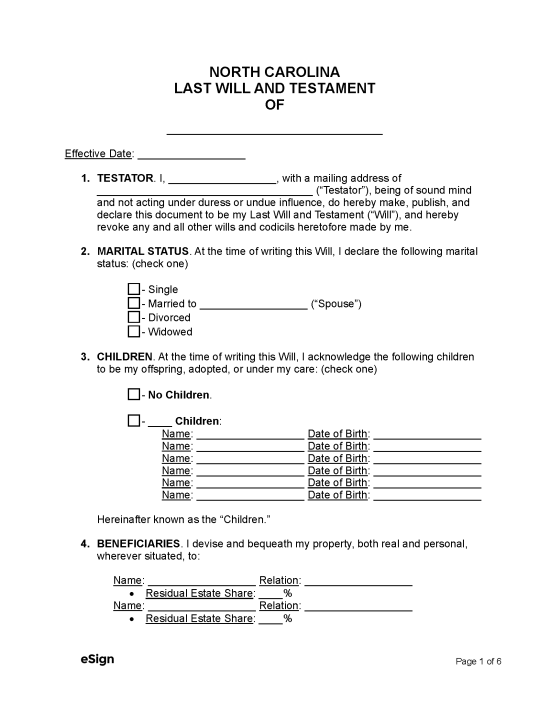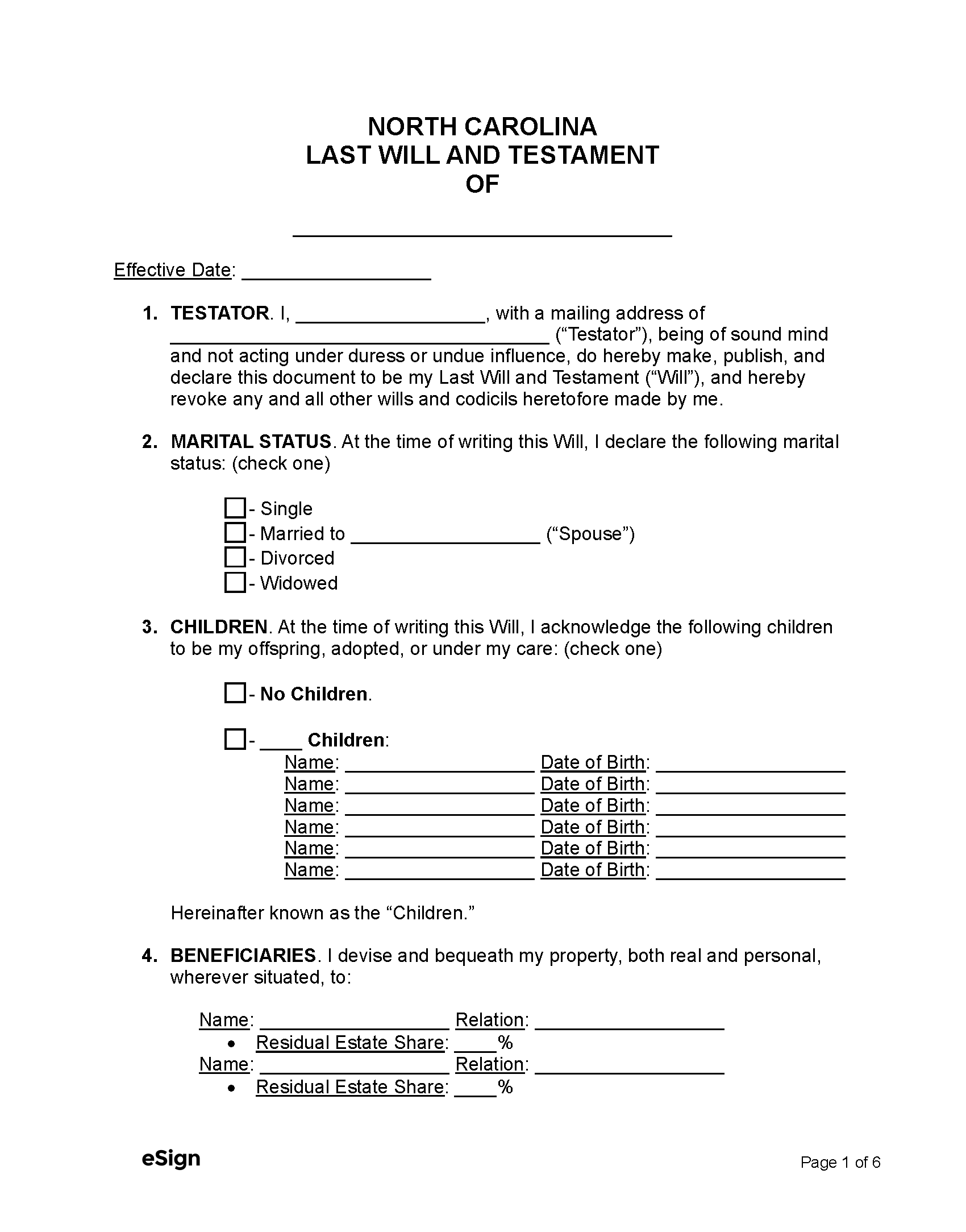State Laws
A will can be created by anyone of sound mind who is 18 years of age or older.[1]
Holographic Wills – Handwritten or “holographic” wills are valid if written entirely in the testator’s handwriting.[2] No attesting witnesses are needed for a holographic will.
Revocation – A testator’s will can be revoked by writing a revocatory document, executing a new will, or destroying the original will with the intent to revoke it.[3] When a marriage dissolves, the components of the will that benefit the former spouse are automatically revoked.[4]
Signing Requirements – The testator and two competent witnesses must sign.[5] If a witness stands to benefit from the will, at least two other disinterested witnesses must also sign.[6]
Probate Process in North Carolina (12 Steps)
When someone dies, their will needs to be examined and approved by the court before their property can be distributed to beneficiaries. This legal procedure is called probate and will be handled by the executor named in the will.
- Probate Application
- Letters Testamentary
- Probate Bond (If Applicable)
- Notice to Creditors
- Additional Notice Requirements
- Inventory of Estate
- Apply for Year’s Allowance (Optional)
- Pay Claims
- Tax Returns
- Asset Distribution
- Accounting
- Probate Completion
1. Probate Application
If the estate’s value does not exceed $20,000 (or $30,000 if the surviving spouse is the only heir), an Affidavit for Collection of Personal Property of the Decedent may be used to acquire the decedent’s personal property without going through probate.[7]
To begin the probate process, the executor must ask the superior court for permission to administer the estate. This request is made by submitting the following items to the clerk’s office in the county where the decedent resided at the time of death:
- Last Will and Testament
- Certified Death Certificate
- Application for Probate and Letters Testamentary (AOC-E-201) – Must include a basic inventory of the decedent’s assets (see instructions).
- $120 filing fee
Court forms and payments can be submitted electronically in counties that offer e-filing services.
Summary Administration – When the surviving spouse is the sole heir, they can ask the court to grant an Order of Summary Administration. This order lets the spouse collect the decedent’s property without going through the usual administration process.[8] This filing packet contains all the paperwork needed to apply for summary administration.
2. Letters Testamentary
After requesting permission to administer the estate, the executor must file an Oath/Affirmation (AOC-E-400) with the court to declare that they’ll perform their responsibilities faithfully and honestly.[9]
If the court decides that the executor is qualified, they’ll issue a document called Letters (AOC-E-403), often referred to as “Letters Testamentary.” This form is official proof of the executor’s authority to administer the estate and carry out the will’s instructions.
3. Probate Bond (If Applicable)
Typically, executors residing in North Carolina are not required to buy a probate bond, which is a financial security that protects the estate against the executor’s actions. However, if the will specifically orders it, or if the superior court finds it necessary, then a bond must be obtained before the Letters Testamentary are issued.[10] These companies offer North Carolina probate bonds:
4. Notice to Creditors
Creditors must be notified of their right to present claims against the estate.[11] To accomplish this, the executor needs to publish a notice once a week for four consecutive weeks in a newspaper that’s qualified to print legal advertisements and circulates in the county where the estate is being administered. If there is no suitable newspaper, the notice must either be:
- Published in any local newspaper and posted at the courthouse; or
- Posted at the courthouse and in four additional public places.
The notice must state the executor’s mailing address and the deadline for filing claims, which must be at least three months from the date the notice was published or posted. If applicable, the newspaper will provide the executor with an Affidavit to prove the publication occurred.
5. Additional Notice Requirements
Within 75 days after receiving the Letters Testamentary and before filing proof of notice, the executor must personally deliver or send by first-class mail a copy of the notice to all creditors they actually know about or should know about through reasonable investigation, including the Division of Health Benefits of the Department of Health and Human Services (if the decedent was receiving Medicaid).
After the creditors have been notified, a copy of the notice, the Affidavit from the newspaper (if applicable), and an Affidavit of Notice to Creditors must be filed with the court.[12]
6. Inventory of Estate
Within three months after receiving approval to administer the estate, the executor must file with the court an inventory of all real and personal property owned by the decedent at the time of death.[13] The Inventory for Decedent’s Estate (AOC-E-505) is the form used to report this information.
7. Apply for Year’s Allowance (Optional)
At any point within the first year after the date of death, an Application and Assignment Year’s Allowance (AOC-E-100) may be filed to request financial support for the decedent’s spouse or children while the estate is being administered. A court hearing will be held to decide whether to approve the application. If approved, the following payments may be issued:
The allowance will come from the decedent’s personal belongings, cash, or a mix of both, but it won’t include real estate. Any amounts owed to the decedent’s spouse or children will take priority over payments owed to creditors.
8. Pay Claims
Once the period for filing claims against the estate expires, the executor can begin to pay the decedent’s debts. Administration costs must be paid first, followed by all claims made against the estate (state law outlines the order of priority for claims).[16] If necessary, the executor can sell the decedent’s property to help pay off creditors.
Note: If the executor has to sell the decedent’s real estate to settle debts, they must first ask the superior court for permission. However, consent is not required if the will specifically grants the executor permission to sell real estate.[17]
9. Tax Returns
Certain factors, such as the date of death and the value of the decedent’s estate, may require the executor to pay estate taxes and file federal and state fiduciary income tax returns. Executors should contact the North Carolina Department of Revenue and a federal tax office to determine their tax obligations. If no taxes are owed, the executor must file an Estate Tax Certification (AOC-E-212) with the court.
If estate tax returns are required, the executor should ask the tax authorities for Closing Letters (paperwork showing that tax obligations have been fulfilled). Copies of the Closing Letters should be filed with the court.
10. Asset Distribution
Once the executor has paid the administration expenses, taxes, and debts, they can start distributing assets according to the instructions written in the decedent’s will.[18] Receipts of the distributions should be obtained from each beneficiary.
11. Final Accounting
The executor must make a Final Accounting of the assets, debts, and distributions.[19] If all claims have been paid, the Final Accounting may be submitted to the court anytime after the deadline mentioned in the notice to creditors. In all situations, the executor must file the Final Accounting within one year after receiving permission to administer the estate, unless an extension has been granted.
If the court grants an extension for the Final Accounting, the executor must file an Annual Accounting within one year from the date they became qualified to serve.[20] If the estate isn’t settled within a year, the executor must ask the court to keep the estate open, and they must file a new Annual Accounting each year until the Final Accounting is made.
Note: The final and annual accountings will be reported in an Account (AOC-E-506).
12. Probate Completion
When a Clerk of the superior court has approved the final accounting, they’ll conclude the probate process by issuing an order that releases the executor from their obligations toward the estate.[21]

